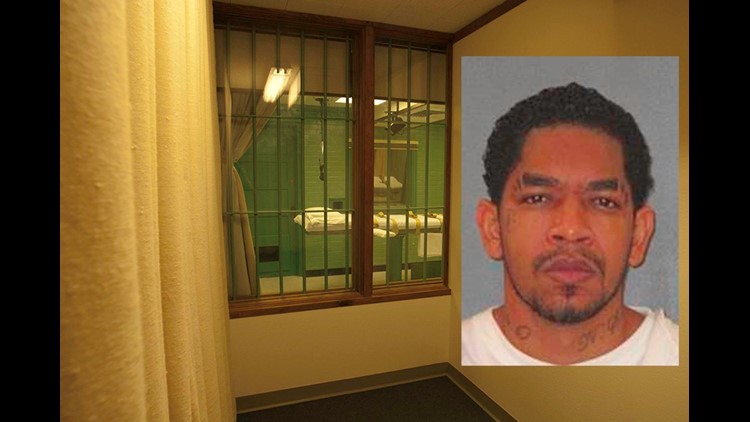The Texas Tribune -- A year ago, his death penalty case was being argued before the U.S. Supreme Court. On Wednesday evening, he was put to death by the state of Texas.
Erick Davila, 31, was executed after a relatively short nine years on Texas’ death row. He was convicted in 2009 for repeatedly shooting at a Fort Worth house hosting a child’s birthday party, killing the mother and 5-year-old daughter of Jerry Stevenson, whom Davila claims was a rival gang member. In his last appeal, Davila asked the high court to stop his execution based on new claims of drug use during the murders and a conflict of interest with the Tarrant County District Attorney's Office.
Minutes before his scheduled 6 p.m. death, the U.S. Supreme Court rejected his final appeal, and he was strapped to a gurney in a mint green room, where he spoke his final words as Stevenson and other family members of the victim watched through a glass pane.
“Yes, I would like to say nephew, it burns, huh," he said. "You know, I might have lost the fight, but I’m still a soldier. I still love you all. To my supporters and family, y’all hold it down. Ten Toes down right. That’s all.”
He was then injected with a lethal dose of pentobarbital and was pronounced dead at 6:31 p.m.
Davila fought his sentence to the end, maintaining to the courts that he only intended to kill his rival, Jerry Stevenson, not the man’s daughter, Queshawn, or her grandmother, 47-year-old Annette. It was an important distinction because the jury had to find that Davila intended to kill multiple people to be eligible for the death penalty. Prosecutors argued Davila always intended to kill more than his rival, pointing to his statement to police that he was trying to get “the guys on the porch” and “the fat dude.”
“I wasn't aiming at the kids or the woman and don't know where the woman came from,” Davila said in a written statement to police, according to court documents. “I don't know the fat dudes name, but I know what he looks like, so I recognized his face.”
It was the question of intent that eventually led Davila’s case to the nation’s high court last April on a legal technicality. His current lawyer, Seth Kretzer, argued that when jurors at his trial questioned if they needed to decide whether Davila intended to kill his two victims or if he intended to kill someone and in the process fatally shot two others, the judge — who is now the Tarrant County criminal district attorney — erred in her answer.
The judge responded that Davila would be responsible for a crime if the only difference between what happened and what he wanted was that a different person was hurt — without affirming to them that Davila must have intended to kill more than one person. The jury found him guilty.
Though his lawyer at trial objected to the judge’s instructions, the objection was overruled, and the issue wasn’t brought up again in Davila’s state appeals, which Kretzer said was bad lawyering. The question that landed in front of the U.S. Supreme Court was whether Kretzer could raise the jury instruction in federal courts because of ineffective appellate lawyers.
Generally, federal courts can’t take up issues that could have been raised in state courts, but there is an exception when the trial lawyer is found to have been ineffective. But in Davila’s case, it was the appellate lawyers, not the trial lawyer, who were being accused of dropping the ball. In June, the justices decided in a split ruling that the two types of attorneys can’t be treated equally, and Davila became eligible for execution.
He didn’t stop fighting.
After Tarrant County set an execution date, Davila filed new appeals. In his last petition, Kretzer asked the U.S. Supreme Court to delay the execution because he recently discovered that Davila’s original co-defendant told the judge that Davila was “heavily intoxicated” during the shooting — a fact that was apparently unknown by defense attorneys.
Kretzer wanted time to further develop claims that the prosecution may have failed to disclose information about Davila being on drugs at the time of the murders.
“While intoxication is not a defense to murder, it would have been an issue that would have been relevant to mitigation and sentencing,” Kretzer said Tuesday, indicating a jury could have been persuaded to hand down the lesser sentence of life in prison without parole if it was brought up at trial.
The Texas Attorney General’s office argued against the appeal in its court filing, saying that Davila himself would obviously be aware of his own intoxication, so it was information the defense could have found earlier, disqualifying it from court review now. The courts agreed with Texas, denying Davila’s motions.
Davila’s team had also asked the nation’s high court to remove the Tarrant County District Attorney’s office from his case since the criminal district attorney, Sharen Wilson, was the judge who oversaw his trial, and his former state appellate attorney now works for her.
“The clients should obviously be able to trust their lawyers,” Kretzer said. “You can’t get confidential information from your client and then turn around and use it against him.”
A spokeswoman for Wilson said Tuesday she couldn’t comment on the pending case, but she pointed to the office’s court briefings, which indicates Davila’s previous appellate attorney is not allowed to have any involvement in the case. The state also argues that Wilson’s minimal action in the case does not violate Davila’s due process rights.
“Davila presents no direct authority mandating the office’s removal from their Texas statutory duty to represent the State, especially when the action complained of is the ministerial act of setting an execution date,” wrote Texas Assistant Attorney General Katherine Hayes in the state’s briefing to the Supreme Court.
Davila’s execution marks the fifth execution in Texas this year and the ninth in the country.
This article originally appeared in The Texas Tribune.
Texas Tribune mission statement
The Texas Tribune is a nonprofit, nonpartisan media organization that informs Texans — and engages with them — about public policy, politics, government and statewide issues.



